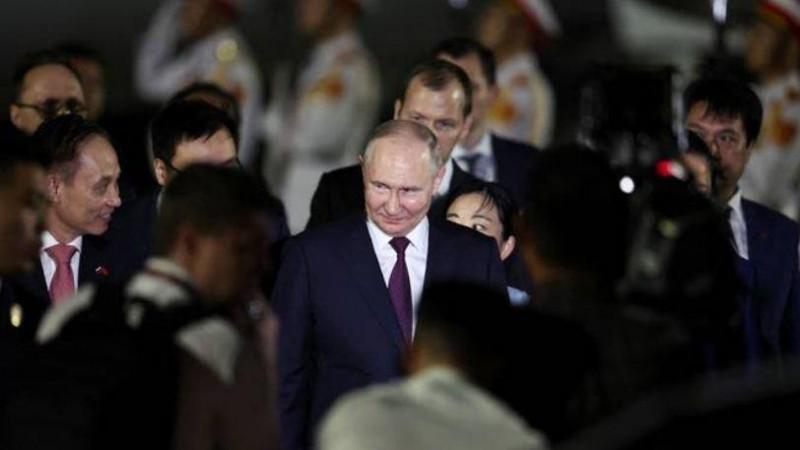
In a decisive moment for European security and economic strategy, EU leaders have unveiled a dual initiative: the creation of a "drone wall" stretching from the Baltic to the Black Sea, and a legal-financial framework to deploy frozen Russian assets for Ukraine's reconstruction. The announcements, made at a European summit, mark a new phase in the continent's response to Russia's war.
European Commission President Ursula von der Leyen framed the decision as a defining test. "Russia has turned the skies into a battlefield. Our response must be unity, technology, and scale," she said, stressing that Europe must adapt its defense industries with speed.
Finnish Prime Minister Petteri Orpo, whose country shares a long border with Russia and has championed the drone wall concept, underlined the urgency. "This is about protecting every metre of European airspace. The threats are not abstract. They are daily realities for Finland, Estonia, Latvia, Lithuania, Poland, and beyond."
A Continental Drone Shield
The drone wall, first advocated by the Baltic states, has now received the endorsement of the European Council. Leaders envision an integrated network of radars, jammers, counter-drone interceptors, and joint command systems that will bind together Europe's eastern frontier.
Estonian Prime Minister Kaja Kallas emphasized the importance of unity. "Europe cannot afford silos. Either our defenses are connected, or our vulnerabilities will be exploited," she warned, pointing to lessons from Ukraine's experience.
The project will draw on cross-border procurement and pooled funding, ensuring smaller member states have access to the technologies required to defend against hostile UAVs. Ukrainian models of layered defenses are being studied closely.
The Frozen Assets Question
Equally significant was the decision to move forward with using frozen Russian state assets, estimated at more than 200 billion euros across Europe. Belgium, home to the clearinghouse Euroclear, holds the largest share.
Belgian Prime Minister Alexander De Croo said the balance between justice and legality must be struck carefully. "We are not confiscating, we are using the extraordinary revenues of these assets. International law must be respected, but justice for Ukraine must also be served."
French President Emmanuel Macron emphasized accountability. "The aggressor must pay. This is about accountability as much as it is about financing. Europe cannot allow Russia to destroy without consequence."
European Parliament President Roberta Metsola added a broader warning. "Europe cannot rely on patchwork solutions. Our security and our credibility are on the line, and both require a united front."
Legal and Banking Concerns
The plan to use profits from immobilized Russian assets represents a novel experiment in international finance. Instead of outright confiscation, the EU intends to redirect interest and windfall revenues to back loans for Ukraine's reconstruction. Legal experts argue this method is more defensible under international law, though risks of litigation by Russia remain high.
Klaas Knot, President of De Nederlandsche Bank, cautioned against undermining financial trust. "The credibility of the international financial system rests on the sanctity of assets, even in war," he said, noting that Europe must balance justice for Ukraine with the stability of global markets. Banking analysts have pointed out that Euroclear has already set aside billions in windfall profits, but channeling these funds into sovereign loans will require unprecedented levels of regulatory scrutiny, compliance oversight, and political consensus.
Russian Reaction
Moscow has fiercely rejected both initiatives. Kremlin spokesperson Dmitry Peskov condemned the drone wall and the asset plan. "Europe is building a new Iron Curtain, this time in the skies. As for the theft of Russian assets, it is nothing less than financial piracy, and Russia will respond accordingly."
Russian officials have hinted at countermeasures against European businesses operating inside Russia, raising concerns about retaliation.
A Strategic Shift
For Europe, these decisions go beyond technical defense upgrades or financial arrangements. They mark a deeper shift toward assuming responsibility for continental security and reconstruction in Ukraine.
EU High Representative Josep Borrell said the moment carried historic weight. "We are entering a new era where European security and European values are at stake together. The choices we make now will define the credibility of Europe for decades."
Von der Leyen summed up the resolve. "This is Europe saying: we will defend our skies, we will rebuild Ukraine, and we will not be intimidated."
[Major General Dr. Dilawar Singh, IAV, is a distinguished strategist having held senior positions in technology, defence, and corporate governance. He serves on global boards and advises on leadership, emerging technologies, and strategic affairs, with a focus on aligning India's interests in the evolving global technological order.]

















